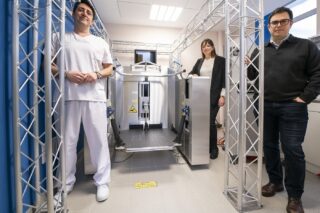Underpinned by developing digital technologies, integrative medicine is playing an increasingly important role in the provision of more holistic, preventative, patient-centric healthcare solutions. It focuses on meeting a patient’s physical, mental, and spiritual needs through a combination of traditional, complementary, and alternative medicine.
A Changing Healthcare Landscape
Despite ongoing developments in modern medicine, contemporary society is experiencing a series of epidemics and pandemics of non-communicable, chronic diseases and communicable, infectious diseases. These public health crises, which are partly attributable to human behavior and lifestyle, mean that a growing number of people are now looking to supplement conventional medical treatments—involving drugs such as antibiotics and anti-inflammatories—with therapies based on traditional, complementary and alternative medicine (TCAM).
Today, underpinned by developing digital technologies, so-called “integrative medicine”—or integrated medicine—is playing an increasingly important role in the provision of more holistic, preventative, patient-centric healthcare solutions.
According to a recent report from business consulting firm Grand View Research, the value of the global complementary and alternative medicine market will reach nearly US$ 700 billion by 2030, with a year-on-year growth rate of 25% between now and the end of the decade. The rising prevalence of neurological illnesses and cancer is seen as one of the major factors driving this growth.
Prevention Rather Than Treatment
Integrative medicine promotes prevention and healing, rather than disease and treatment. It views patients as people with minds and spirits, as well as bodies, and includes these dimensions in diagnosis and treatment. It involves patients and doctors working together to maintain and improve health by focusing on factors such as diet, exercise, quality of rest and sleep, and the nature of relationships.
People with long-lasting, chronic, or complex conditions may find this integrative approach particularly useful. Pain management can often be effectively handled with complementary, evidence-backed healthcare treatments, such as acupuncture, animal-assisted therapy, aromatherapy, dietary and herbal supplements, massage, meditation, yoga, and naturopathy. A growing range of such treatments are now offered in hospitals.

The adoption of integrative medicine offers substantial benefits for both patients and healthcare providers. For patients, it signifies a paradigm shift, treating them not as standardized organisms in isolation, but as complex individuals within intricate environments. The preventative focus of integrative medicine ensures early detection and treatment, ultimately alleviating the strain on healthcare systems.
Digitally Driven Integration in Holistic Healthcare and Preventative Medicine
Digital technologies are transforming the landscape of holistic healthcare and preventative medicine by connecting patients with a wide array of healthcare providers and advanced diagnostic tools. It enables interoperability and the visualization and sharing of patient-specific data. Over the last decade, technological advances have led to explosive growth in virtual consultations, remote monitoring, mobile health, digital therapeutics, and the application of artificial intelligence (AI).
Companies like Quantum Meta Health, Core Spirit, Sofia Health, CARE, and Cureable are at the forefront of this revolution, offering innovative solutions that bridge the gap between traditional and alternative medicine, enhance early detection of health issues, and provide personalized care.
Quantum Meta Health leverages cutting-edge quantum physics principles to offer remote holographic body scans and treatments, utilizing DNA and RNA to trace conditions through wave characteristics of various body components. Their advanced bioresonance technology aims to remove energy blocks that cause disease, facilitating the body’s self-healing process. As a pioneer in this field, Quantum Meta Health’s Global Wellness Program aspires to extend healthy lifespans significantly, demonstrating a commitment to longevity and holistic well-being without the need for traditional patient-physician interactions.
UK-based Core Spirit unites healthcare professionals and alternative practitioners on a single platform, providing users with access to a blend of treatment options. Product manager Anastasia Burakova emphasizes the platform’s role in integrating different healthcare approaches, suggesting that this synergy represents the future of healthcare. Similarly, Sofia Health empowers independent practitioners and connects them with individuals seeking holistic care. By simplifying administrative tasks and enhancing visibility through an integrated scheduling system and secure payment processing, Sofia Health ensures that clients can easily find the right care providers.


CARE, a Swiss company, combines cutting-edge technology with personalized medical advice to promote preventive healthcare. Their comprehensive check-up service includes thorough health assessments, blood work, heart health monitoring, and body composition analysis, aiming to detect potential health issues early. CARE’s approach emphasizes the importance of proactive health management and offers additional services such as blood analyses, cardio-respiratory tests, and coaching. Meanwhile, Cureable, based in India, focuses on personalized therapy for children with special needs, offering expert care at home. Their detailed planners and trackable progress reports ensure holistic development for children with conditions such as autism, ADHD, and cerebral palsy, highlighting the role of digital technologies in providing tailored support.


These companies exemplify how digital technologies are reshaping healthcare by making it more accessible, personalized, and integrative. By bridging the gap between traditional and alternative medicine, enhancing early detection of health issues, and providing tailored care, they are paving the way for a more holistic and preventative approach to health and well-being.











